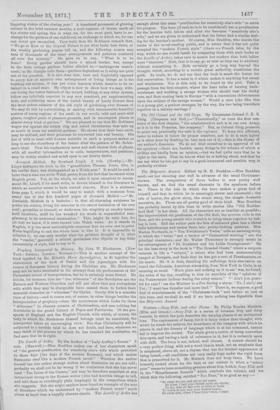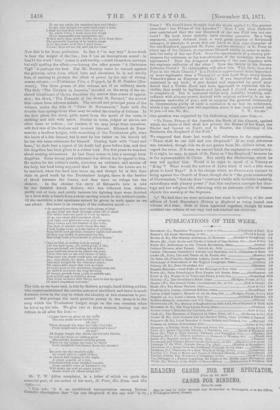PORTItY.—Song-Tide, and other Poems. By Philip Bourke Marston. (Ellis and
Grean.)—Song-Tide is a series of between fifty and sixty sonnets, in which the poet describes the varying phases of an unrequited love. The copiousness of fancy, for it is fancy rather than thought, with which he treats his subject, the abundance of the imagery with which he adorns it, and the fluency of language which is at his command, cannot fail to impress the roador. Tire whole gives a notion of being somewhat thin-spun, and having a lack of substance in it, but it is certainly spun with skill. The form is not, indood, well chosen. A sonnet should be a very porfeot thing, with not a word that is weak, not an emphasis that is misplaced, above all, not a rhyme that has the faintest appearance of being forced,—all conditions not very easily kept under the rigid form that is prescribed for it. Mr. Marston does not keep them. We have honestly looked about for the boat, as oar custom is when a "minor poet" seems to have something genuine about him, loth in Song-Tide an d in tho "Miscellaneous Sonnets" which conclude the volume, and we think that the following, entitled "Too Near," is as good as any:— " So close we are, and yet so far apart, So close, I fool your breathe upon my cheek; So far, that all this love of inino is weak To touch in any way your distant heart; So close that, when I bear your votes, I start
To sea my whole life standing bare and bleak; So far, that though for years and years I seek, I shall uut anti thee other than thou art ; So, while I live, I walk upon the verge
Of an Impassable and changeless sea,
'Which moro than dorith divide Ins, love, from thee ; The mournful beating or its leaden surge
Is all the mush; new that I shall hoar ;
love thou art too far, and yet to near."
Now this is far from perfection. In line 4 "in any way " is to weak to bear the weight of the line; line G has an incongruous sound ; in line 11 the word " love" comes in awkwardly,—small blemishes, perhaps, but still spoiling the effect.--Among the other poems "A Christmas Vigil" is perhaps the best. But Mr. Mareton must be warned against the grievous error, from which here and elsewhere ho is not wholly free, of seeking to produce the effect of power by the usa of strong,
coarse colours.—Y'ristissinue Fuer, a by E. H. Pembor (Bos- worth), The three poems of this volume are of no ordinary merit. The first, "The Caryatee in Laconia," founded on the story of the en- slaved inhabitants of Darya., describes the sorrow that comes of oppres- sion; the third, The Peasants of the Great St. Bernard," the sorrow that comes from adverse nature. The second and principal poem of the volume, under the title of " Ccour do Boautnaneir," deals with the trouble that springs from what may be called the cruelty of fortune. In the first place, the story, quite apart from the merit of the verse, is striking and told with spirit. Stories in verse, judged as stories, are often tame or tedious ; our readers. if We may judge from ourselves, will find this of the freshest and keenest interest, Edouard de Beau- manoir, a landless knight, with something of the Troubadour gift, wins the heart of a fair damsel, but is sent by her father on his travels till he can win some substance for himself. Coming back with "land and fame," he finds that a report of his death had gone before him, and that his Angeline has been given to a robber lord. For five years he wanders about seeking adventures. At last there comes to him a message from Angeline, Some wrong past endurance has driven her to appeal to him. He makes for the robber's castle, contrives an entrance, and carries ofi the lady, her lord being supposed dead. In duo time the lovers are to be married, when the dead man turns up, and thought he is this time slain in good truth by the Troubadour knight, there is the barrier of blood between the lovers, and they have no refuge but the Cloister. In the cloister the story of Edouard'e love is told by his faithful friend Hubert, who has followed him thither partly out of love, and partly because his fighting days wore finishod by a blow with a bench from a stout serving wench in the robber's castle. Of the narrative, a fair specimen cannot be given in such space as we can afford. But here is an example of the reflective mood :—
" So passed from them Moir little gleam of bliss
Ac one brio!' sun-shaft through HOMO rift of cloud The sullen heavone parts to close up again;
fir as one sweat delirious hour of air, Anal light, arid gladeorni noes, and company, 31.on's voisee and the hubbeh of the town, The linea of market-carts along the way. Fresh hedge-rows, widths; dance of rivulets, tiong•bircls and gardens, summer sights and sounds Of then' lost world, to prisoners for life, • MarcLiNg from prison-house to prison-house."
Men no lost, so loving, and 80 young!
Life hut half spent, yet nothing left of life; Love perfected, yet nothing left of love ; Love outlived ones to be reborn for over, 'Twice knotted on the evil skeins of time, That once eut, death could only out again,— Ay I only death, far death, from both of them Jealously bodged by the reluetant years ; 'Th.' inexorable years that love to creep At foot's-puce to the wretched, lengthening out As skillful torturers the long between Of dreary growth from youth to middle-age, And middle-age to dallying decay, Thai holds its hand with theirs, and mikes its sport Of man's impatient welcome."
The tale, as we have said, is told by Hubert, a rough, hard-hitting soldier, who cannot understand the subtler nature of his friend, and there is much dramatis force in the way in which the identity of this eharacter is pre- served. But perhaps the most genuine poetry in the story is in the song which the Troubadour knight sings on the one oceamien when he takes up his late. We give two or three abatises, leaving out the refrain in ail after the first ;—
" Comes there no glory on thy walls The eon made never heretofore, Ale city!
When through thy ways her light font fail
From neighbour's door to neighbour's door? Ab city/ Alt happy, happy city, where my beloved dwells.
ler o'er thy Seine no ruining glow Beyond nut warmest evening gleam, When on thy bridge she leans to throw
Love-freighted rese-loavcs down the stream? ..... . . . But unto me the smallest sight
Or sound akin to aught intim, A church boll ringing in the night, A street, a gable, nra tree, O'orshadewing some burgher's eaves,
Some varlet'e voice or huckster's cry Willeltake my soul as aspen leaves
Shake white an others silent lie,"



































 Previous page
Previous page